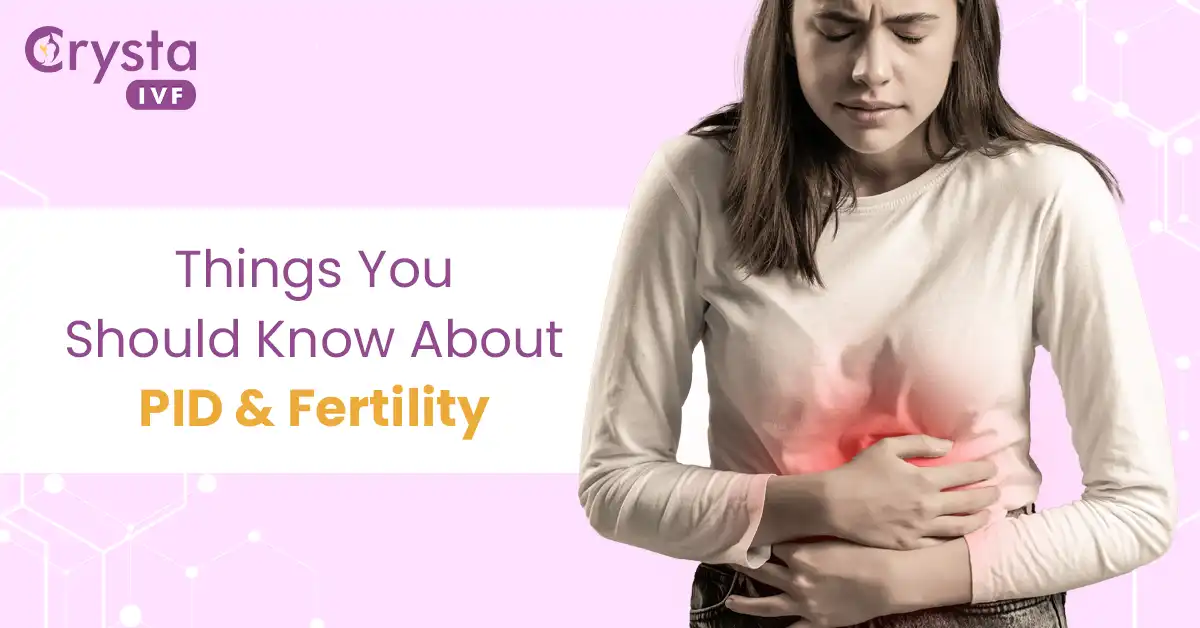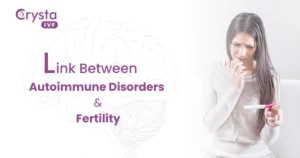Pelvic Inflammatory Disease (PID) is a frequent & common infection that occurs among women of reproductive age. Pelvic Inflammatory Disease (PID) is a severe medical condition that can have a significant impact on a woman’s fertility.
A bacterial infection causes PID in the uterus, fallopian tubes, or ovaries, and it can cause pain, fever, abnormal vaginal discharge, and other symptoms.
It is estimated that about 20% of women with PID may become infertile, 40% develop chronic pain, and 1% of women who conceive have an ectopic pregnancy.
While there is treatment available to better manage the condition, what happens when it is left untreated?
Here’s what every woman should know about the condition, PID causes, its impact on fertility health, and the possible treatment for PID infertility.
What Exactly Is Pelvic Inflammatory Disease (PID)?
Pelvic Inflammatory Disease (PID) is an infection of the female reproductive organs, usually caused by sexually transmitted bacteria. The most common type of PID is caused by a bacterial infection that spreads from the vagina to the cervix, uterus, ovaries, and fallopian tubes.
Different bacteria, including Chlamydia and gonorrhea can cause PID. It is usually spread through sexual contact, but can also be caused by childbirth, abortion, or other invasive medical procedures.
Diagnosis can be made through a physical examination and through lab tests to test for the presence of certain bacteria.
If left untreated, PID can cause serious complications, including infertility, chronic pelvic pain, and an increased risk of ectopic pregnancy.
Symptoms Include:
Women with PID may experience a variety of clinical signs and symptoms that range from, for some women ,the signs are unnoticeable or subtle. The most common symptoms of PID are:
- Chronic pelvic pain
- Increased risk of ectopic pregnancy
- Abnormal discharge
- Pain during sex
- Frequent urination
- Fever with chills
- Adnexal tenderness
- Difficulty in conceiving
- Cervical motion tenderness
- Lower abdominal pain
Common Risk Factors:
While PID can occur at any age, women younger than age 25 years are more likely to develop it. These are the most common risk factors:
- A person who is more sexually active
- Past PID
- History of sexually transmitted infection
- Multiple sexual partners
- Having intercourse without contraception
Pelvic Inflammatory Disease (PID) & Fertility
Pelvic Inflammatory Disease (PID) is an infection of the female reproductive organs and can have a significant impact on fertility. While PID can cause serious health complications, the most common concern among women is its effects on fertility.
PID can cause the fallopian tubes to become blocked or scarred, which makes it difficult or impossible for sperm to reach the egg. This can lead to infertility and an increased risk of ectopic pregnancy, which can be dangerous for both mother and baby.
According to a study on risk factors for ectopic pregnancy, 26% of women with PID are at risk. However, timely PID treatment might prevent severe complications.
If you’re pregnant, know all about PID treatment in pregnancy.
Despite that, PID can also cause scarring and inflammation of the reproductive organs, which can impair their function and lead to infertility. Women need to seek treatment for PID as soon as possible to reduce the risk of long-term complications.
With proper treatment, most women can regain fertility and have a successful pregnancy.
How is Pelvic Inflammatory Disease Diagnosed?
If you notice any of the symptoms mentioned above, you should immediately reach out to the doctor, as the sooner it’s addressed, the better. Waiting long is more likely to cause serious problems and damage reproductive organs permanently.
Some of the common methods to diagnose the condition includes –
- To diagnose the condition, a gynecologist or other healthcare professional will do a pelvic exam
- Medical history and necessary information about sexual habits, birth control methods, and symptoms
- A sample of fluid may be taken to determine gonorrhea and chlamydia
- Blood test to check for sexually transmitted infections (STIs)
- Advanced diagnoses such as Ultrasonography
- Endometrial biopsy
- Laparoscopy
- Other imaging tests to examine internal organs
- Urinalysis to check for a urinary tract infection (UTI)
Preventions:
There are certain precautionary measures you should take to avoid complications. These include –
- Follow safe sex guidelines
- Use of contraception
- Adopt methods to reduce the risk of STIs
- Get tested immediately if you’re at risk of an STI or have symptoms
- Talk with a gynecologist for expert advice
Treatment Options:
In cases where PID is left untreated, it may cause serious health problems and infertility. For these reasons, it is essential to be aware of the symptoms of PID and to seek medical attention immediately if you experience any of them.
Early diagnosis and treatment of PID are essential to avoid complications and preserve fertility.
Generally, PID can be treated with antibiotics. However, in cases where the infection has caused significant damage, fertility treatments may be necessary to restore normal fertility. These treatments can include surgery to remove scar tissue or IVF (in vitro fertilization), a form of assisted reproductive technology.
Regardless of the treatment chosen, it is important to seek professional medical advice at Crysta IVF to ensure the best possible outcome.
Consult a fertility specialist today at the best IVF Centre in Kolkata to know more about your fertility health and the best treatment options if you’re dealing with infertility but wish to be a parent.




